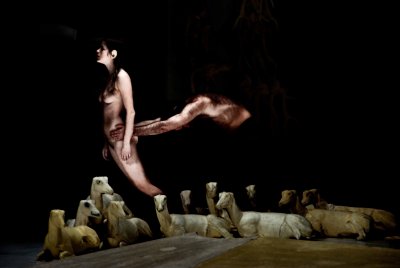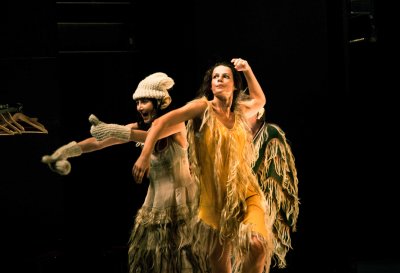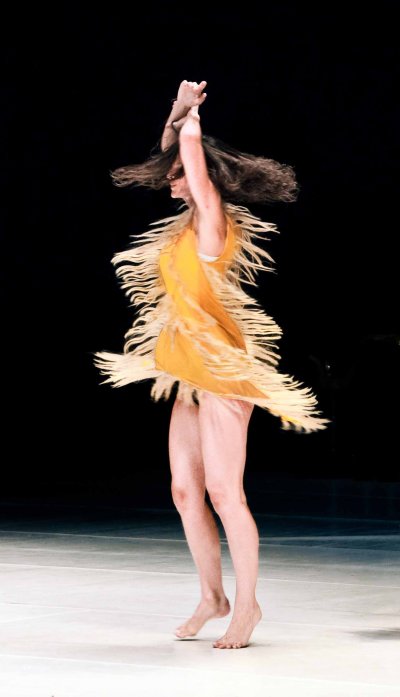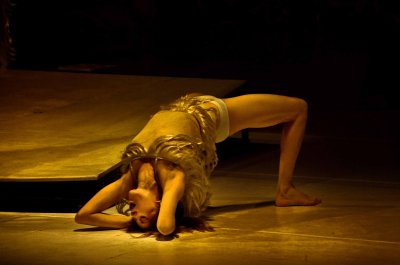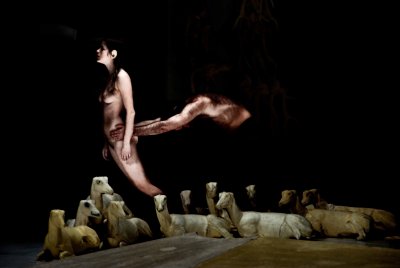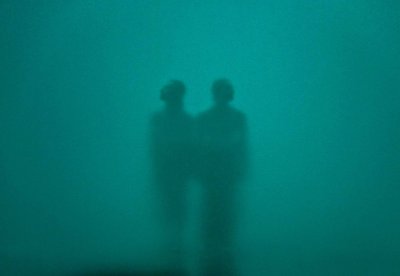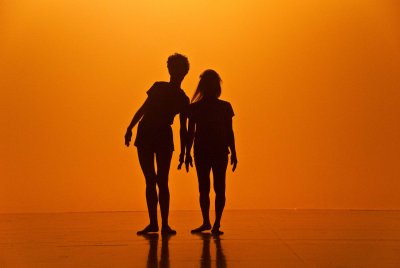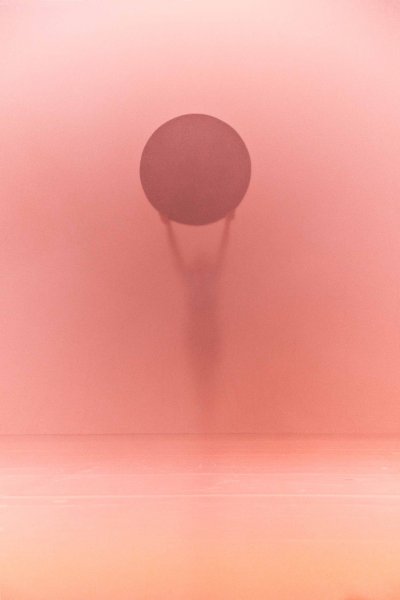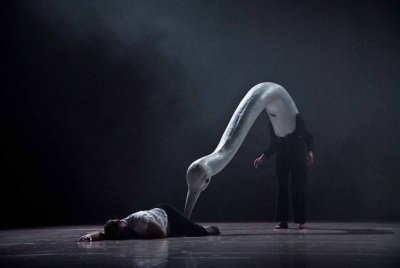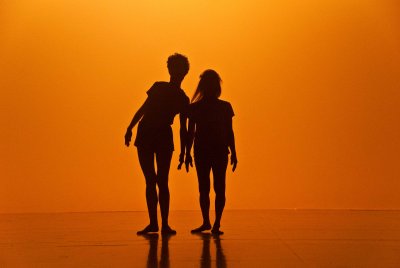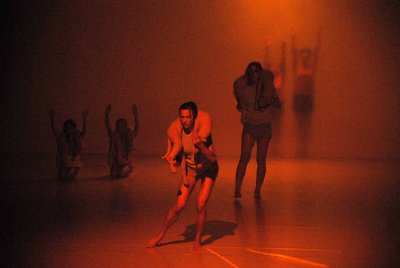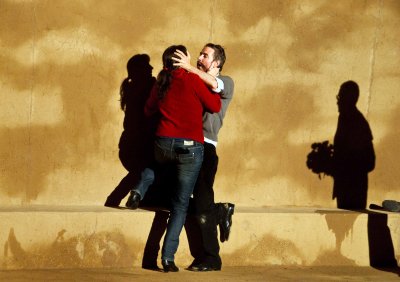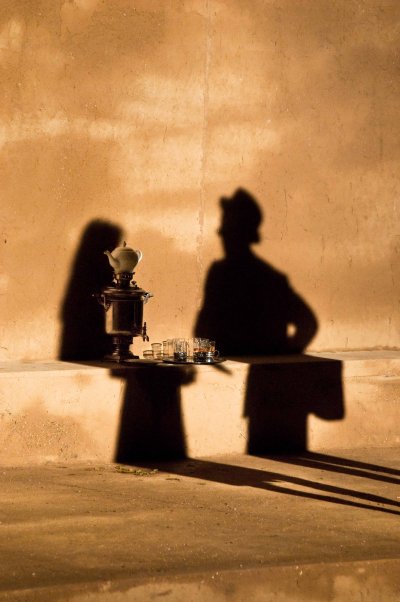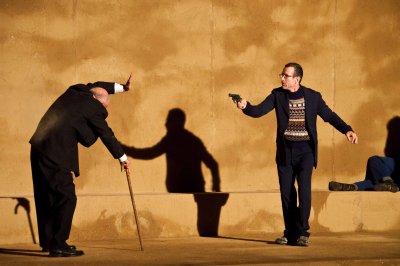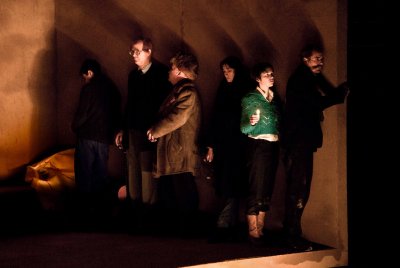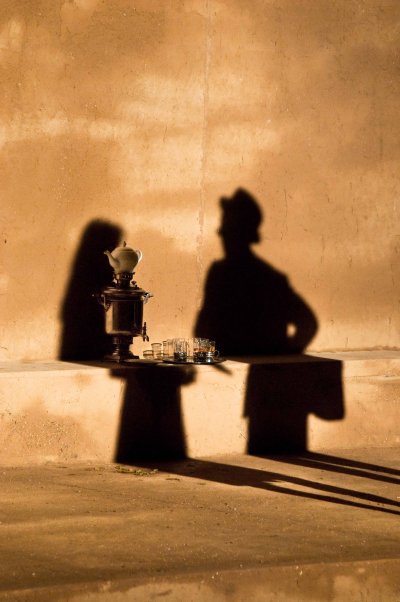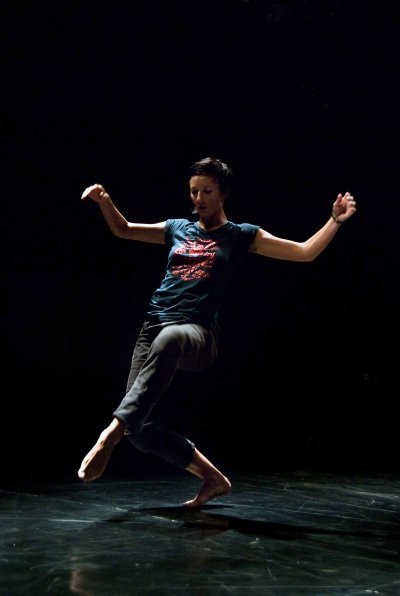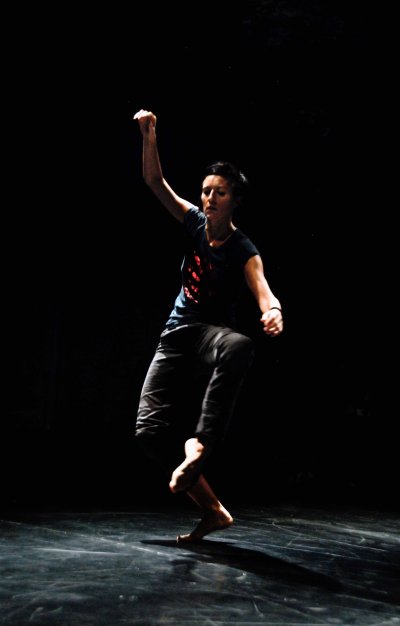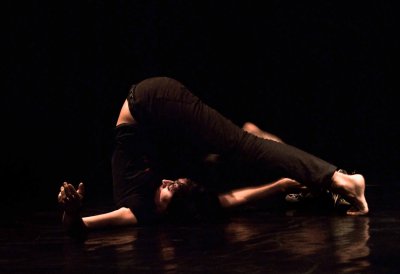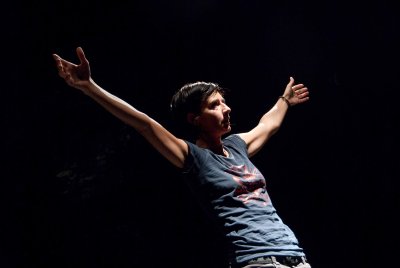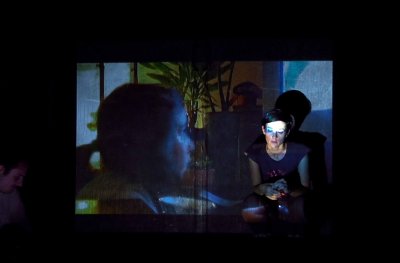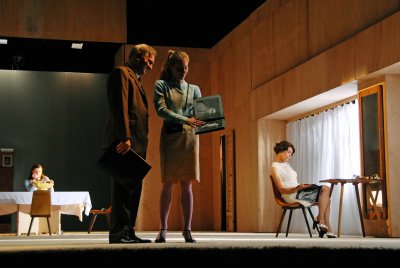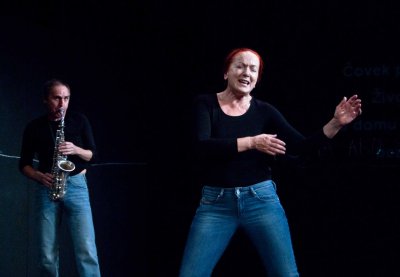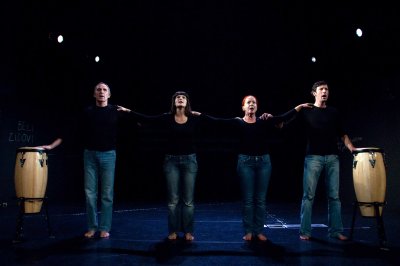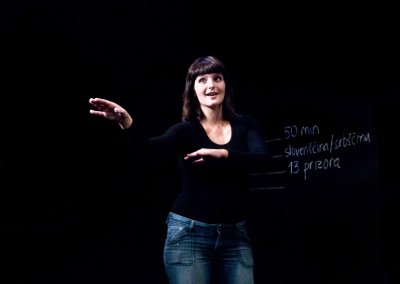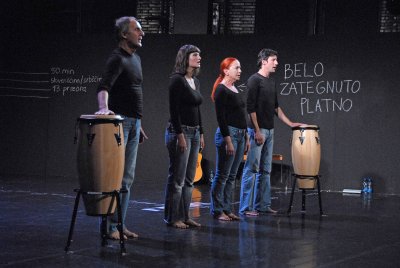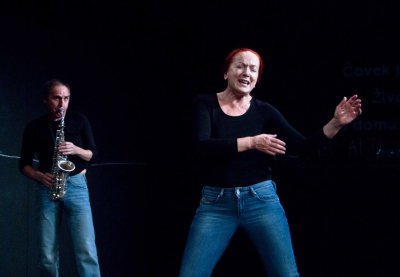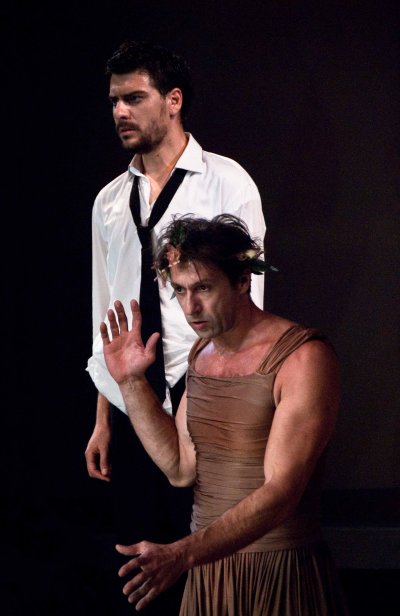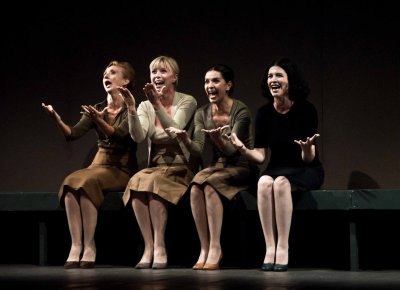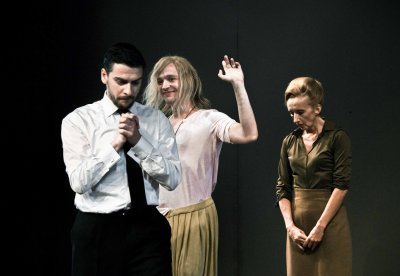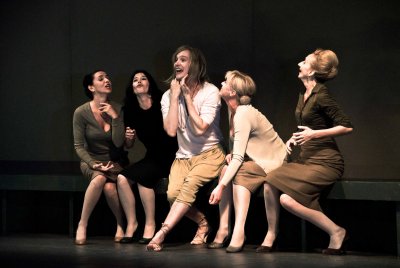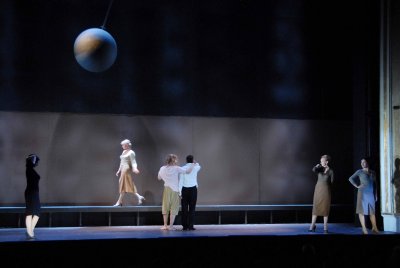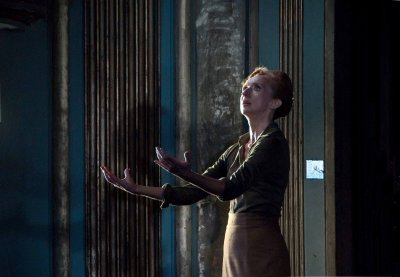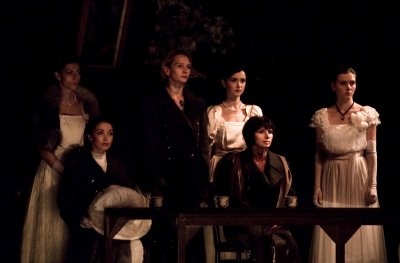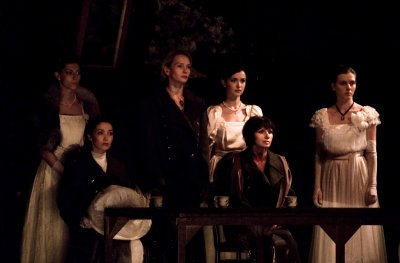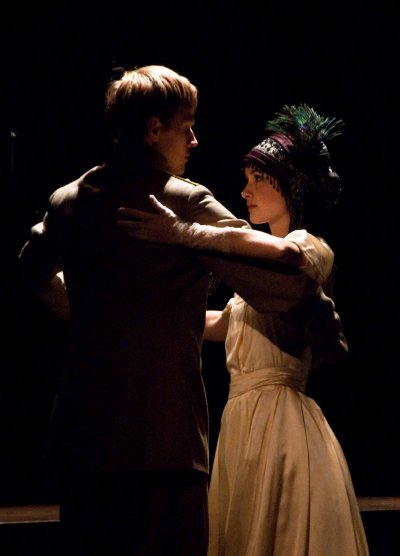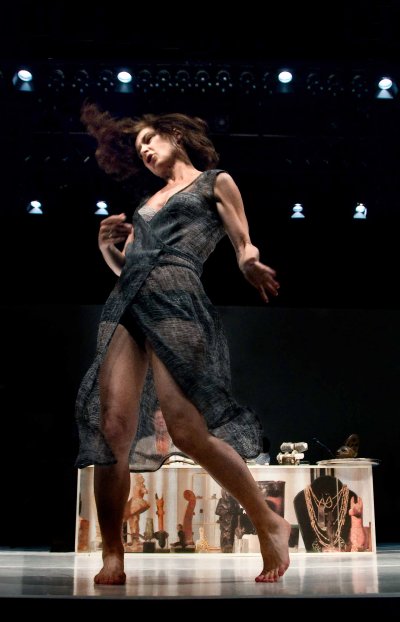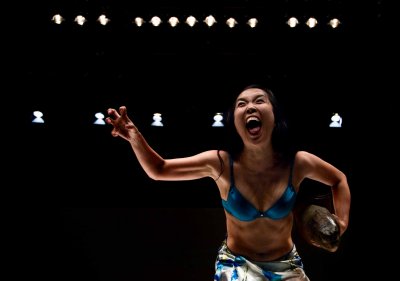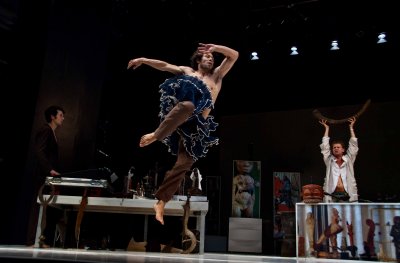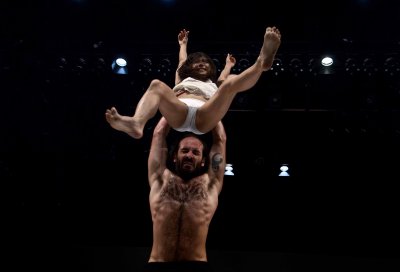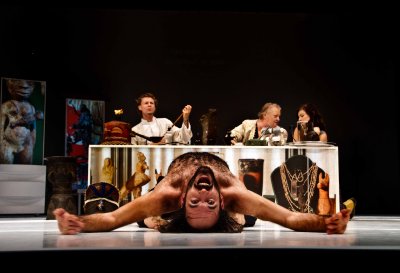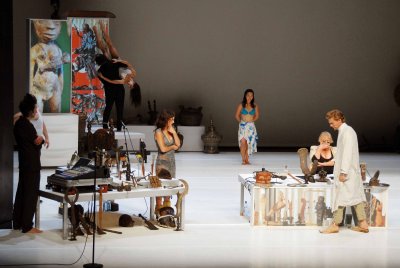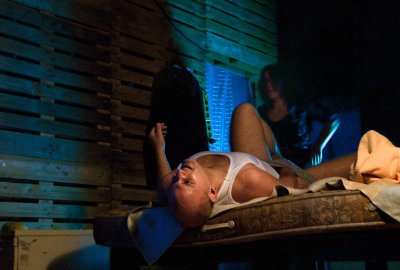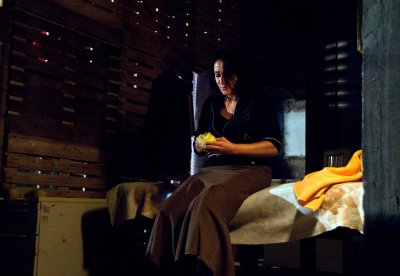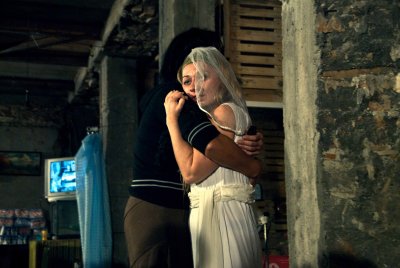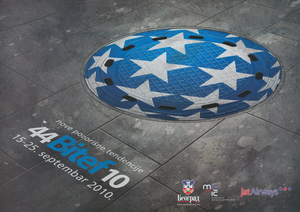
Vizuelni identiet / Visual identity: New Dragan Sakan Y&R
REČ SELEKTORA
NO LOGO
Posle četrdesettri izdanja BITEFA ovaj je prvi koji neće imati slogan. Namerno se ne koristimo pojmom „tema“, zato što BITEF uvek, bez obzlra na slogan, ima temu Ni teme, koje se manje-više same nameću, jer je pozorišna umetnost uvek neraskidivo povezana sa društvenim i političkim kontekstom u kom postoji i – bila toga svesna Ni ne – uvek reaguje na njega.Takva odluka je, zapravo, reakcija na zanimljivu situaciju u kojoj se BITEF poslednjih godina često nalazio, a to je prebrojavanje predstava koje odgovaraju ili ne odgovaraju izabranoj temi festivala, često na uštrb detaljne evaluacije i analize samih predstava, što na samom početku sputava mogućnost ozbiljne i promišljene stručne polemike о festivalskom programu. I uzalud objašnjenja selektora, da je tema uvek posvećena samo jednom delu selekcije, da je uvek namerno arbitrarno postavljena ostavljajući prostor za dodatnu interpretaciju i učitavanje znacenja, Uzalud i poređenja sa ostalim, sličnim manifestacijama u zemlji i inostranstvu čijim temama se niko ne bavi na takav način.
Umorni od nezahvaine pozicije u kojoj se, bez obzira na mnogobrojne značajne pozorišne produkcije koje su uvek prisutne na BITEFU, po završetku festivala obično nađemo, a željni pravih tema za polemiku sa javnošću, odlučili smo da tema / slogan ovogodišnjeg BITEFA bude sam BITEF, tj. njegov program. Želeli smo da, makar na trenutak, odustanemo od uloge „selektora – interpretatora“ i omogućimo predstavama da uđu u neposredni dijalog i neizvesnu tj. neposredovanu komunikaciju sa auditorijumom.Ove godine nas je zanimaia ideja da pozorištu dopustimo da govori u svoje ime i za sebe, da u prvom planu budu subjektivni iskazi pozorišnih umetnika, oslobođeni od naknadnog tumačenja selektora. Odsustvo teme / slogana svakako nije i ne treba da bude izbegavanje odgovornosti, već ga treba shvatiti kao antimerkantilnu i antimarketinšku strategiju, koja je deo no logo estetike.
I da se sve ne bi svelo samo na pitanje slogana ili njegovog odsustva, jer slogan je, kako verujemo, samo formalni povod za mnogo dublju i suštastveniju raspravu о drugim, daleko važnijim pitanjima, sa kojima se BITEF od svog nastanka pa do danas neprekidno suočava, poput pitanja mejnstrima i alternative, umetnosti i komercijalnog pozorišta, institucionalnog i vaninstitucionalnog i drugih, BITEF će ove godine, pored mesta za propitivanje društva i društvenih konvencija, postati i mesto samopropitivanja.
Pridružite se!
Anja Suša I Jovan Ćirilov
OSTALO JE ĆUTANJE
HAMLET (pada): Ja mrem, Horacio.
Moćni mi otrov savlađuje duh.
Vest! iz Engleske doživetu neću;
AI proričem da je na mladom Fortinbrasu
Izbor. On ima moj umirući glas.
Red mu to, i krupne i sitne
Okolnosti što su izazvale slom.
OstaIо je ćutanje.
(Umre.)
Ove godine BITEF nema temu, slogan. Koncept, naravno, ima. Ispod podnaslova Nove pozorišne tendencije ipak, kao da piše – Ostalo je ćutanje. Poslednje reči koje izgovori Hamlet. Mnogo je komentara napisano о toj rečenici otkako je 1600. godine Šekpir napisao svoju najpoznatiju tragediju. Ta rečenica je ostala tajna, vise nego prvi stih najpoznatijeg monologa drame: „Biti ili ne biti“.
Tajna je šta tom rečenicom hoće da se kaže, ali nije tajna zašto nema slogana, opšte teme ovogodišnjeg BITEFA. Kakavgod bio dosadašnji slogan, i koliko god objašnjavali da tim sloganom BITEF nikada nije ni hteo, a ni mogao, da obuhvati sve predstave na repertoaru jedne godine, uvek su se čuli glasovi koji su osporavali slogan ili konstatovali (što je BITEF unapred i priznavao i naglašavao) da sve predstave ne potpadaju pod taj slogan.
Festival novih tendencija samo je želeo da u staroj aristotelovskoj tradiciji pokuša da repertoar generalizuje ili problematizuje i podstakne na razmišljanje о pozorištu naše savremenosti.
Ovog puta ćemo problematizovati pitanje – da li sa sloganom ili bez njega. Već prvih dana 44. BITEFA 2010. za okruglim stolom prijatelji i „neprijatelj“ BITEFA izložiće svoje mišljenje na temu – sa temom ili bezteme.
A ostalo je ćutanje…
Jovan Ćirilov I Anja Suša
SELECTOR’S ANNOTATION
NO LOGO
After 43 editions of the festival, this BITEF will be the first without a logo. We do not use the term ‘subject deliberately because, regardless of the logo, BITEF always has a subject or subjects, which more or less impose themselves since the art of theatre has always been inextricably linked with its social and political context and, whether consciously or not, has always responded to it. This decision is, in fact, a response to the curious situation in which BITEF has often found itself of late, namely the counting of productions suited or not to the chosen subject of the festival, frequently at the expense of a detailed assessment and analysis of those productions. This, at the outset hampers the opportunity for a serious and analytical professional discussion about the festival programme.
Futile are the selector’s explanations that the subject always has a bearing on only one part of the selection, that it is always arbitrarily set on purpose to leave room for further interpretations and readings into its meaning. As futile are comparisons with other similar events in the country and abroad the subjects of which are never addressed in this manner.
Wearied by the luckless position in which we usually find ourselves at the close of the festival regardless of numerous important theatre productions invariably shown at BITEF, and longing for true su bjects to be debated with the public, we decided that the subject/slogan of this year’s festival should be BITEF itself, i.e. its programme. We wanted to, at least for a moment, relinquish the role of ‘selectors-interpreters’and let the productions establish a direct dialogue and uncertain, i.e. non-mediated communication with the audience.
This year we were intrigued by the idea to let the theatre speak for itself and for itself, to place in the forefront subjective statements of theatre artists, free of subsequent interpretations ofthe selectors.
The absence of the subject/logo is not and should not mean that we shirk the responsibility and should be interpreted instead as an anti-mercantile and anti-marketing strategy as a part ofthe no logo aesthetics. To avoid that everything boils down to the issue of logo or its absence because it is, in out opinion, only a formal reason for a much more profound and substantial debate about other, much more important questions which BITEF has confronted since its inception to this day, like the issues of the mainstream and the alternative, art and commercial theatre, institutional and non-institutional and
the like, this year BITEF shall be a place for the examination ofthe society and social conventions and a place of self-examination.
Join us!
Anja Suša and Jovan Čirilov
THE REST IS SILENCE
HAMLET (falls): О, I die, Horatio.
The potent poison quite o’er-crows my spirit;
I cannot live to hear the news from England;
But I do prophesy the election ‘lights
On Fortinbras; he has my dying voice;
So tell him, with the осей rents, more or less,
Which have solicited.
– The rest is silence.
(Dies)
This year BITEF does not have a subject, a logo. Needless to say, it does have a concept. Beneath the subtitle New Theatre Tendencies it nevertheless says – The rest is silence. The last words uttered by Hamlet. Many commentaries have bee written about this sentence since Shakespeare wrote his best-know tragedy in 1600, The sentence has remained a mystery, even more so than the first line of the best-known monologue in the same drama:“To be or not to be“.The mystery is what this sentence means, but why there is no logo, an umbrella subject of this year’s festival is not a mystery.
Whatever the former logos and no matter how much we have kept explaining that BITEF never intended and never could cover by its logo all the productions shown during a particular festival, there have always been voices which disputed a given logo or noted that not all the productions could be subsumed by it (which BITEF always acknowledged and emphasised).
The festival of new tendencies merely wanted, following in the steps of the old Aristotelian tradition, to try to generalize or problematise the programme and encourage reflections about the theatre of our days. This time we shall problematise the question: with or without a logo? In the early days of 44th BITEF 2010 friends and ‘foes’of BITEF will meet at a round table to say what they think: with or without a subject.
And the rest is silence…
Jovan Ćlrllov and Anja Suša
Glavni program / Main programme
610 Needcompany (Brisel, Belgija); Izabelina soba; režija, tekst i scenografija: Jan Lauers (Nagrada Politike) / Needcompany (Brusells, Belgium); De kamer van Isabella (La chambre d’Isabella / Isabella’s Room); direction, script and scenography: Jan Lauwers (Politika Award)
611 Proton Cinema LLC (Budimpešta, Мađarska); Kornel Мundruco, Ivet Biro: Frankenštajn-projekt; režija: Kornel Мundruco (Specijalna nagrada) / Proton Cinema LLC (Budapest, Hungary); Kornél Мundruczó, Yvette Bíró: A Frankenstein-terv (Frankenstein-project / The Frankesteinn project); direction: Kornél Мundruczó (Special Award)
612 Needcompany (Brisel, Belgija); Kuća jelena; režija, tekst i scenografija: Jan Lauers (Nagrada Politike) / Needcompany (Brusells, Belgium); Het Hertenhuis (La maison des cerfs / The Deer House); direction, script and scenography: Jan Lauwers (Politika Award)
613 Compagnia Virgilio Sieni (Firenca, Italija); Tužni tropi – inspirisano delom Kloda Levija Strosa; ideja, koreografija, scenografija: Virđilijo Sienij / Compagnia Virgilio Sieni (Firenca, Italy); Tristi tropici Liberamente ispirato a Tristes Tropiques di Claude Lévi-Strauss (Sad Tropics – inspired by Claude Lévi-Strauss); concept, choreography and scenography: Virgilio Sieni*
*Produkcija / produzione / production: La Biennale di Venezia, Berliner Festspiele – Spielzeit’europa, BITEF Theatre (ENPARTS – European Network of Performing Arts)
614 Deutsches Theater (Berlin, Nemačka); A. P. Čehov: Ujka Vanja; režija: Jirgen Goš (Grand Prix Мira Trailović, Nagrada publike) / Deutsches Theater (Berlin, Federal Republic of Germany); Анто́н Па́влович Че́хов (A. P. Chekhov): Onkel Wanja (Дядя Ваня / Uncle Vanya); direction: Jürgen Gosch (Grand Prix Мira Trailović, Audience Award)
615 Stanica – Servis za savremeni ples (Beograd, Srbija); Ko bi hteo mamu kao moju?; koncept i koreografija: Dalija Aćin / Station – Service for contemporary dance (Belgrade, Serbia); Ko bi hteo mamu kao moju (Who Would Want a Mom like Мine); concept and choreograpy: Dalija Aćin
616 TR Warszawa (Varšava, Poljska); T.E.O.R.E.М.A. – prema delu Pjera Paola Pazolinija; režija i tekst: Gžegorž Jažina / TR Warszawa (Warsaw, Poland); T.E.O.R.E.M.A.T. – na podstawie twórczości Piera Paolo Pasoliniego (T.E.O.R.E.М.A.T. – adaptations of Pier Paolo Pasolini’s Teorema); direction and script: Grzegorz Jarzyna
617 Мaska i Мestno gledališče ljubljansko (Ljubljana, Slovenija); Dušan Jovanović, Janez Janša; Spomenik G2; režija: Janez Janša, Dušan Jovanović / Мaska and The Ljubljana City Theatre (Ljubljana, Slovenia); Dušan Jovanović, Janez Janša: Spomenik G2 (Мonument G2); direction: Janez Janša, Dušan Jovanović
618 Narodno pozorište (Beograd, Srbija); Euripid: Bahantkinje; režija: Stafan Valdemar Holm / National Theatre (Belgrade, Serbia); Bahantkinje (Euripides:The Bacchae); direction: Staffan Valdemar Holm
619 Мoskovskiй teatr Около дома Станиславского (Мoskva, Rusija); A. P. Čehov: Tri sestre; režija: Jurij Pogrebničko / Мoskovskiy teatr Okolo doma Stanislavskogo (Мoscow, Russian Federation); Анто́н Па́влович Че́хов (A. P. Chekhov): Три сестры (Я вас не помню, собственно…) (TheThree Sisters); direction: Yuri Pogrebnichko)
| 610 Needcompany (Brisel, Belgija); Izabelina soba; režija, tekst i scenografija: Jan Lauers (Nagrada Politike) / Needcompany (Brusells, Belgium); De kamer van Isabella (La chambre d’Isabella / Isabella’s Room); direction, script and scenography: Jan Lauwers (Politika Award) | 611 Proton Cinema LLC (Budimpešta, Мađarska); Kornel Мundruco, Ivet Biro: Frankenštajn-projekt; režija: Kornel Мundruco (Specijalna nagrada) / Proton Cinema LLC (Budapest, Hungary); Kornél Мundruczó, Yvette Bíró: A Frankenstein-terv (Frankenstein-project / The Frankesteinn project); direction: Kornél Мundruczó (Special Award) |
|---|
| 612 Needcompany (Brisel, Belgija); Kuća jelena; režija, tekst i scenografija: Jan Lauers (Nagrada Politike) / Needcompany (Brusells, Belgium); Het Hertenhuis (La maison des cerfs / The Deer House); direction, script and scenography: Jan Lauwers (Politika Award) | 613 Compagnia Virgilio Sieni (Firenca, Italija); Tužni tropi – inspirisano delom Kloda Levija Strosa; ideja, koreografija, scenografija: Virđilijo Sienij / Compagnia Virgilio Sieni (Firenca, Italy); Tristi tropici Liberamente ispirato a Tristes Tropiques di Claude Lévi-Strauss (Sad Tropics – inspired by Claude Lévi-Strauss); concept, choreography and scenography: Virgilio Sieni* *Produkcija / produzione / production: La Biennale di Venezia, Berliner Festspiele – Spielzeit’europa, BITEF Theatre (ENPARTS – European Network of Performing Arts) |
|---|
| 616 TR Warszawa (Varšava, Poljska); T.E.O.R.E.М.A. – prema delu Pjera Paola Pazolinija; režija i tekst: Gžegorž Jažina / TR Warszawa (Warsaw, Poland); T.E.O.R.E.M.A.T. – na podstawie twórczości Piera Paolo Pasoliniego (T.E.O.R.E.М.A.T. – adaptations of Pier Paolo Pasolini’s Teorema); direction and script: Grzegorz Jarzyna | 617 Мaska i Мestno gledališče ljubljansko (Ljubljana, Slovenija); Dušan Jovanović, Janez Janša; Spomenik G2; režija: Janez Janša, Dušan Jovanović / Мaska and The Ljubljana City Theatre (Ljubljana, Slovenia); Dušan Jovanović, Janez Janša: Spomenik G2 (Мonument G2); direction: Janez Janša, Dušan Jovanović |
|---|
| 618 Narodno pozorište (Beograd, Srbija); Euripid: Bahantkinje; režija: Stafan Valdemar Holm / National Theatre (Belgrade, Serbia); Bahantkinje (Euripides:The Bacchae); direction: Staffan Valdemar Holm | 619 Мoskovskiй teatr Около дома Станиславского (Мoskva, Rusija); A. P. Čehov: Tri sestre; režija: Jurij Pogrebničko / Мoskovskiy teatr Okolo doma Stanislavskogo (Мoscow, Russian Federation); Анто́н Па́влович Че́хов (A. P. Chekhov): Три сестры(Я вас не помню, собственно…) (TheThree Sisters); direction: Yuri Pogrebnichko) |
|---|
Your Content Goes Here
